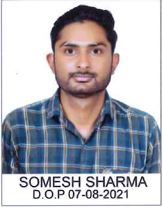Department of Veterinary Medicine: The courses of medicine are designed to learn application of the knowledge of basic and preclinical sciences in diagnosis, etiology, prevention, treatment and prognosis of diseases of livestock, poultry, pet and zoo animals and maintenance of ethics during all clinical procedures.
The Department has following sanctioned strength of Faculty:
Professor - 1
Associate Professor – 1
Assistant Professors – 3
| S.No. |
Name |
Designation |
Qualification |
Service Period at AVC |
Photo |
Biodata
|
|
01
|
Dr. Suman Nath Mishra
|
Assistant Professor
|
B.V.Sc & AH, M.V.Sc
|
30.11.2016 to till Continue
|
 |
Biodata |
|
02
|
Dr. Deepa Rathore
|
Assistant Professor
|
B.V.Sc & AH, M.V.Sc
|
20.08.2024 to till Continue
|
 |
Biodata |
|
03
|
Dr. Somesh Sharma
|
Assistant Professor
|
B.V.Sc & AH, M.V.Sc
|
19.04.2025 to till Continue
|
 |
Biodata |
|
04
|
Dr Anju K. Daniel
|
Assistant Professor
|
B.V.Sc & AH, M.V.Sc and phD
|
03.11.2025 to till Continue
|
 |
Biodata |
|
05
|
Dr. Meet K. Pandya
|
Assistant Professor
|
B.V.Sc & AH, M.V.Sc
|
23.12.2025 to till Continue
|
 |
Biodata |
THEORY
UNIT-1 (GENERAL)
History and scope of Veterinary Medicine, concept of animal diseases. Concepts of diagnosis, differential iagnosis,
treatment and prognosis. General systemic states, hyperthermia, hypothermia, fever, septicemia, toxemia, shock, allergy, anaphylaxis, oedema, coma, anaemia, common clinical poisonings and dehydration. Estimates of diseases, patterns of disease, disease monitoring and surveillance, herd health and quarantine.
UNIT-2 (SYSTEMIC DISEASES)
Etiology, clinical manifestations, diagnosis, differential diagnosis, treatment, prevention and control of the following
diseases of cattle, buffalo, sheep, goat, horse, pig, dog, cat and poultry: Diseases of digestive, respiratory, cardiovascular, urinary, nervous, musculoskeletal, haemopoietic, and lymphatic systems, skin, sense organs including affections of peritoneum, liver and pancreas. Emergency medicine and critical care.
UNIT-3 (METABOLIC AND DEFICIENCY DISORDERS)
Diagnosis and management of diseases caused by deficiency of iron, copper, cobalt, zinc, manganese, selenium, calcium, phosphorus, magnesium, iodine, vitamin A, D, E, B complex, K and C. Diseases of neonates, Alternative or integrated or ethno veterinary medicine in animal disease management. Aetiology, clinical manifestations, diagnosis, differential diagnosis, treatment prevention and control of metabolic or production and endocrine diseases of cattle, buffalo, sheep, goat, horse, pig, dog, cat and poultry i.e. Milk fever, eclampsia, osteodystrophy fibrosa, lactation tetany, downer cow syndrome, ketosis, fat cow syndrome, hypomagnesaemia, Nutritional haemoglobinuria, azoturia, diabetes, hypothyroidism, Cushing syndrome, Addison’s disease and Gout.
UNIT-4 (ZOO AND WILD ANIMAL MEDICINE)
Principles of zoo hygiene, public health problems arising from zoos. Prevention, control and treatment of infectious,
parasitic, nutritional and metabolic diseases in zoo and wild animals including exotic birds. Acts and Rules related to Zoo and wild animals. National and international organizations and institutions interlinked to wild and zoo animals – role and functioning.
UNIT-5 (BACTERIAL, FUNGAL AND RICKETTSIAL DISEASES)
Aetiology, epidemiology, clinical manifestations, diagnosis, treatment, prevention and control of bacterial, fungal and rickettsial diseases of livestock: mastitis, hemorrhagic septicaemia, brucellosis, tuberculosis, Johne's disease, listeriosis, leptospirosis, campylobacteriosis, actinomycosis, actinobacillosis, bordetellosis, glanders, strangles, ulcerative lymphangitis, colibacillosis, fowl typhoid, pullorum disease, fowl cholera, avian mycoplasmosis, spirochaetosis, salmonellosis, swine erysipelas, contagious caprine pleuropneumonia, contagious bovine pleuropneumonia, anthrax, clostridial infections, ehrlichiosis, chlamydosis, Q fever, anaplasmosis, dermatophilosis, aspergillosis, candidiasis, histoplasmosis, sporotrichosis, coccidiodomycosis, mycotoxicosis and rhinosporidiosis.
UNIT-6 (VIRAL AND PARASITIC DISEASES)
Aetiology, epidemiology, clinical manifestations, diagnosis, treatment, prevention and control of viral and parasitic diseases of diseases of cattle, buffalo, sheep, goat, horse, pig, dog, cat and poultry: Foot and mouth disease, rinderpest, bovine viral diarrhoea, malignant catarrhal fever, infectious bovine rhinotracheitis, ephemeral fever, blue tongue, sheep pox, goat pox, PPR, classical swine fever, rabies, equine influenza, equine infectious anemia, equine rhinopneumonitis, canine distemper, infectious canine hepatitis, canine parvoviral disease, corona viral infection, adeno virus infection, feline rhinotracheitis, feline pan leucopenia, feline infectious peritonitis, avian influenza, New Castle disease, Marek's disease, avian leucosis, infectious bronchitis, infectious laryngotracheitis, avian encaphalomyelitis, chicken reo virus, fowl pox, infectious bursal disease, chicken infectious anemia, inclusion body hepatitis-hydropericardium syndrome, emerging and exotic viral diseases of global importance. Parasitic diseases: Trematodes, cestodes, nematodes, protozoan infections and external parasites of clinical importance.
UNIT-7 (JURISPRUDENCE, ETHICS, AND ANIMAL WELFARE)
Legal duties of veterinarians, laws related to medicine, evidence, common offences against animals and laws related to these offences. Examination of living and dead animals in criminal cases. Cruelty to animals and bestiality. Legal aspects of: Examination of animals for soundness, examination of injuries and post-mortem examination. Causes of sudden death in animals. Collection and despatch of materials for chemical examination, detection of frauds-doping, alternation of description, bishoping etc. Cattle slaughter and evidence procedure in courts. Provincial and Central Acts relating to animals. Glanders and Farcy Act 1899 (13 of 1899). Dourine Act 1910 (5 of 1910), Laws relating to offences affecting Public Health. Laws relating to poisons and adulteration of drugs. Livestock importation act, liability and insurance. Code of conduct and ethics for veterinarians - the regulations made under the Act. Animal welfare organizations and its role in animal welfare, welfare assessment, behaviour and animal welfare, principles and philosophy of animal welfare, animal welfare ethics, improving animal welfare through legislation and incentives, assessment of physiological, behavioural, disease and production measures of animal welfare, assessing welfare in practice, environment enrichment, euthanasia, welfare of animals used in education and research and transportation, religion and animal welfare, human and animal welfare conflict, veterinary disaster management, human−animal interactions, economics and animal welfare and veterinarians as animal welfare educators.
PRACTICAL
UNIT-1 (GENERAL)
Collection of history and general clinical examination. Collection, preservation, packing and dispatch of samples from clinical cases. Nasogastric and orogastric intubation in animals. Oxygen therapy in veterinary practice. Gastric and peritoneal lavage. Collection and examination of cerebrospinal fluid. Blood transfusion.
UNIT-2 (SYSTEMIC DISEASES)
Special examination of cardiovascular system. Examination of urinary system. Special examination of respiratory system. Special examination of gastrointestinal system. ECG, Echocardiography, Ultrasonography, Endoscopy. Special examination of sense organs. . Examination of eye and ear. Collection and examination of peritoneal fluid. Peritoneal dialysis. Neurological examination in animals. Lymph node biopsy and bone marrow aspirate. Methods of medication. Disease Estimation.
UNIT-3 (ZOO AND WILD ANIMAL MEDICINE)
Management and restraint of zoo and exotic animals. Drug delivery in zoo and wild animals. Visit to Zooor Sanctuary. Examination of veterolegal cases.
UNIT-4 (BACTERIAL, FUNGAL AND RICKETTSIAL DISEASES)
TB, JD and Mallein testing in animal. Brucellosis testing in animals. Physical and chemical tests for detection of mastitis. Application of molecular and serology techniques on clinical samples for disease diagnosis. Pen-side diagnostic tests for infectious diseases. Practical approaches to disease outbreak investigation and its control.
UNIT-5 (VIRAL AND PARASITIC DISEASES)
Collection and examination of skin scrapings- Parasitic, fungal, bacterial. Examination of blood for parasites. Dark field microscopy. Application of Molecular and serological techniques or clinical samples for diagnosis of viral and parasitic diseases.
ANNUAL EXAMINATION
PAPERS U N I TS MAXIMUM MARKS WEIGHTAGE
THEORY
Paper-I 1, 2, 3 and 4 100 20
Paper-II 5, 6 and 7 100 20
PRACTICAL
Paper-I 1, 2 and 3 60 20
Paper - II 4 and 5 60 20
INTERNAL ASSESSMENT 20